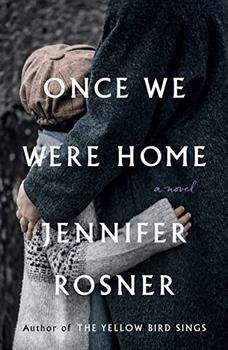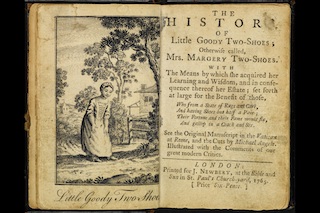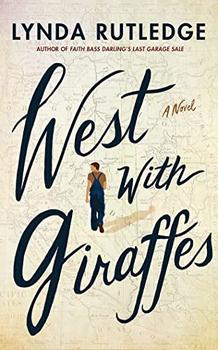Hi Indiana,
Our latest First Impressions feature, Jennifer Rosner's novel Once We Were Home, focuses on the displacement of children from their homes and heritage during World War II, and the struggles they face as adults.
In Editor's Choice, we look at a very different book that also considers the increased awareness that comes with growing out of childhood: H.G. Parry's adult fantasy novel The Magician's Daughter follows 16-year-old Biddy as she comes of age in a world where magic exists everywhere. Our accompanying "beyond the book" article explores the history of female protagonists in children's literature.
Plus, we have an interview with River Sing Me Home author Eleanor Shearer, current and upcoming book club discussions, and a new Wordplay! | | With best wishes,
Davina Morgan-Witts BookBrowse Publisher | | Each month we give away books to BookBrowse members who live in the U.S. to read and review. Here are their opinions on one recently released title. | | Once We Were Home by Jennifer Rosner
"Once We Were Home by Jennifer Rosner is the thoughtful and heartbreakingly beautiful story of displaced children in Europe following World War II and their struggle to find what was stolen from them—identity, family, and a sense of belonging... Fans of Ruta Sepetys will appreciate this author's focus on bringing little-known history to light. I highly recommend this intricately layered story. This would also be a wonderful book club selection." - Mitzi K. (Cumming, GA)
"In her mesmerizing style, Jennifer Rosner introduces us to four characters who suffered through the war and beyond. We meet Ana and Oskar, whose mother had to give her children to a Polish family who would raise them as their own to keep them safe. The children had a wonderful life of learning and love that heart-wrenchingly changed after the war. Where will Ana and Oskar end up? We meet Roger, who grew up in a convent to be kept safe, who was very inquisitive, a clever, witty writer of stories and jokes, and sadly had no parents to go home with on holidays... We meet Renata, as an adult, who is a scientist in Israel at an archeological dig... Historical fiction fans will devour this marvelously written, impeccably researched read." - Elizabeth P. (Lower Burrell, PA)
"Although the chapters alternate among the four characters, their stories are individually absorbing and easy to follow. As the novel progressed, I found myself reading more and more intensely to discover the fate of each child. This was a great read for me and a book I will recommend to my book group and my other historical fiction-loving friends. I loved the way Jennifer Rosner was able to revisit one of the main characters from her book The Yellow Bird Sings in this work!" - Gail K. (Saratoga Springs, NY) | | The Magician's Daughter by H.G. Parry
Review and article by Jo-Anne Blanco
"Magic isn't there to be hoarded like dragon's treasure. Magic is kind. It comes into the world to help. Our job is to make sure it gets to where it needs to go."
In H. G. Parry's novel The Magician's Daughter (an adult fantasy which is likely to resonate with many younger readers), sixteen-year-old Biddy lives on the wild, remote, hidden island of Hy-Brasil, cloaked from the world by powerful magic. Her home is an island of fairy stories and folktales, shadowy forests and mysterious castle ruins, black rabbits and a golden-eyed, shape-shifting animal spirit known as a Púca. Since she washed up on the island in a lifeboat as a baby, Biddy has been brought up by the mage Rowan and his familiar, a rabbit-sometimes-turned-human named Hutchincroft, the only companions she has ever known. Through them, she learns that magic is everywhere; in every star, every leaf and every grain of sand.
The early chapters of The Magician's Daughter superbly evoke the beauty, wonder and fairy-tale aura of Hy-Brasil, the joys and adventures of Biddy's childhood and adolescence and her deepening relationships with her adopted father and his familiar. The sense of place on the island is powerfully rendered, lending the vivid descriptions an air of enchantment and mystery while invoking a history that reaches far back into the mists of time. But, like all fairy tales, the initial idyll cannot last, and darkness must ultimately be faced and fought. ... continued | | Beyond the Book: The Origins of Female Protagonists in Children's Literature | | Bridget (known as Biddy), the protagonist of H. G. Parry's The Magician's Daughter, grows up on the magical, hidden island of Hy-Brasil, with only her father, the mage Rowan O'Connell, and his familiar, a rabbit named Hutchincroft. She is greatly influenced by the stories of heroines she reads about in her father's library; female literary figures with whom she identifies and who help shape her character and moral compass. Biddy's coming of age from an idyllic, magical childhood to a cruel, harsh awakening follows in the footsteps of her heroines, such as Alice from Alice's Adventures in Wonderland, Wendy Darling from Peter Pan, and Sara Crewe from A Little Princess.
Fiction written specifically for children and adolescents has its origins in the 18th century. Prior to this, the oral tradition of nursery rhymes and published religious verses such as Isaac Watts' Divine Songs for the Use of Children (1715) was used to inculcate morals and values. Fairy tales, such as those by Madame D'Aulnoy and Charles Perrault, with their predominantly female protagonists, were not originally intended for children. Nor was the first fairy tale published in English in 1621, which featured a male hero, Tom Thumb, already a well-known figure from folklore. In his 1730 stage play The Tragedy of Tragedies, or the Life and Death of Tom Thumb the Great, Henry Fielding used the same male character to comment satirically on gender roles of the time — and, indeed, Tom Thumb himself would usually be played by a female child actress.
In 1749, Sarah Fielding, Henry's sister, included two fairy tales in her novel The Governess, or Little Female Academy. This book is considered to be the first English-language novel written for children and it is notable that all its characters are female. ... continued | | Interview with Eleanor Shearer | | Eleanor Shearer discusses her first novel, River Sing Me Home, her inspiration to write the story, and the extensive research she carried out to write it.
River Sing Me Home was influenced by a true story. Can you tell us more about that?
When I was sixteen, I went to an exhibition called Making Freedom, that was put on by the Windrush Foundation, a charity that celebrates the contribution of Caribbean people to the UK. Part of the exhibition mentioned that, when slavery ended, there were women who left their plantations to try to find the children who were taken from them and sold away. This was very common during slavery, which was about destroying people's right to connect with their own ancestry and their descendants. The image of these women setting out to repair what slavery had worked so hard to destroy was so powerful that it stayed with me for years.
And I was lucky enough, about five years later, to meet the head of the Windrush Foundation, and I mentioned how much I had been moved by this story in the exhibition. He gave me a book called To Shoot Hard Labour, which is an oral history of a man called Samuel Smith, born in Antigua in the 1870s. He talks about his great-grandmother, Mother Rachael, trying to find one of her daughters after emancipation. Mother Rachael helped inspire the story of Rachel in River Sing Me Home. ...continued | | Solve our Wordplay puzzle to reveal a well-known expression, and be entered to win a one-year membership to BookBrowse!
"R Peter T P P" | | The answer to the last Wordplay: One S D N M A S
"One Swallow Does Not Make a Summer (or Spring)"
Meaning: A single instance does not indicate a trend.
This expression is attributed to Aesop but it is not clear whether it and the related fable date back to Aesop or whether one or both are later additions.
What is clear is that the expression was in use in the middle of the 4th century BC, about 200 years after Aesop is believed to have lived, as it is found in Aristotle's Nicomachean Ethics, a series of ten books, originally ten scrolls, which are believed to be based on notes from his lectures at the Lyceum. In this, among other topics, he explores the elements of happiness and, having listed the attributes, concludes that to be happy takes a lifetime because one swallow does not make a spring. ... continued | | Discussions are open to all, so please join us! If you would like to receive a message when a particular discussion opens, you can sign up for a one-time notification. | | With so many new books published every month, it's difficult to find the standouts, the ones which are really worth your time. This is why hundreds of thousands of readers rely on BookBrowse to do the hard work of sifting though the multitude of titles to find the most promising new books, with a focus on books that entertain, engage and enlighten. | | BookBrowse Highlights is one of our four free newsletters. We also offer Publishing This Week every Sunday, and Book Club News and Librarian News monthly. | |
1-408-867-6500 Toll Free: 1-800-745-5306 (US & Canada)
Copyright 2023 | | | | | | |













No comments:
Post a Comment
Keep a civil tongue.